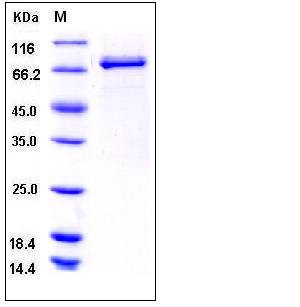Human Lyn Kinase Protein (GST Tag)
JTK8,p53Lyn,p56Lyn
- 100ug (NPP4067) Please inquiry
| Catalog Number | P10829-H09B |
|---|---|
| Organism Species | Human |
| Host | Baculovirus-Insect Cells |
| Synonyms | JTK8,p53Lyn,p56Lyn |
| Molecular Weight | The recombinant human LYN/GST chimera consists of 736 amino acids and predicts a molecular mass of 84.8 kDa. It migrates as an approximately 75 kDa band in SDS-PAGE under reducing conditions. |
| predicted N | Met |
| SDS-PAGE |  |
| Purity | > 94 % as determined by SDS-PAGE |
| Protein Construction | A DNA sequence encoding the human LYN isoform a (NP_002341.1) (Met 1-Pro 512) was fused with the GST tag at the N-terminus. |
| Bio-activity | The specific activity was determined to be 30 nmol/min/mg using Poly(Glu,Tyr) 4:1 as substrate. |
| Research Area | Cancer |Signal transduction |Protein Phosphorylation |Tyrosine Kinase |Src Family |
| Formulation | Supplied as sterile 50mM Tris, 100mM NaCl, pH 8.0, 0.5mM Reduced Glutathione, 10% gly, 0.5mM PMSF 1. Normally 5 % - 8 % trehalose and mannitol are added as protectants before lyophilization. Specific concentrations are included in the hardcopy of COA. |
| Background | Tyrosine-protein kinase Lyn is a member of the Src family of protein tyrosine kinases, which is mainly expressed in hematopoietic cells, in neural tissues liver, and adipose tissue. Tyrosine-protein kinase Lyn has many functions. Lyn kinase may down regulate expression of stem cell growth factor receptor (KIT). Lyn kinase Acts as an effector of EpoR (erythropoietin receptor) in controlling KIT expression and may play a central role in erythroid differentiation during the switch between proliferation and maturation. Lyn kinase also acts as a positive regulator of cell movement while negatively regulating adhesion to stromal cells by inhibiting the ICAM-1-binding activity of beta-2 integrins. Lyn kinase relays suppressing signals from the chemokine receptor CXCR4 to beta-2 integrin LFA-1 in hematopoietic precursors. This kinase is Involved in induction of stress-activated protein kinase (SAPK), but not ERK or p38 MAPK, in response to genotoxic agents. In a word, Lyn kinase functions primarily as negative regulator, but can also function as activator, depending on the context. Tyrosine-protein kinase Lyn Required for the initiation of the B-cell response, but also for its down-regulation and termination. It also Plays an important role in the regulation of B-cell differentiation, proliferation, survival and apoptosis, and is important for immune self-tolerance. It has been reported that Lyn kinase plays a role in the inflammatory response to bacterial lipopolysaccharide. Lyn kinase Mediates the responses to cytokines and growth factors in hematopoietic progenitors, platelets, erythrocytes, and in mature myeloid cells, such as dendritic cells, neutrophils and eosinophils. |
| Reference |
